Dr. Robin Harris Celebrated at Retirement Event
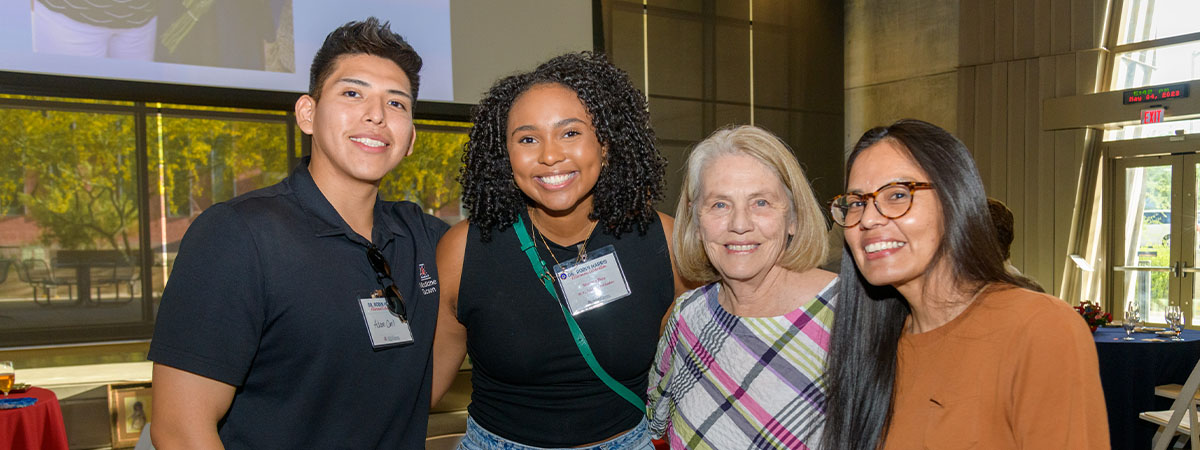
Dr. Robin Harris will soon retire as a professor and researcher from the Department of Epidemiology and Biostatistics at MEZCOPH and as co-director of the UACC Skin Cancer Institute. Dozens of friends, colleagues, alumni and students gathered at a retirement celebration to express their appreciation for all Robin has done for them and the communities they serve during her career.
Robin Harris, PhD, MPH, will soon retire as a professor and researcher from the Department of Epidemiology and Biostatistics at MEZCOPH after more than 30 years of dedicated service to public health. Dozens of friends, colleagues, alumni and students gathered at a retirement celebration to express their appreciation for all Robin has done for them and the communities she served around Arizona. The event was hosted by MEZCOPH, the UACC Skin Cancer Institute, and other supporters.
During her time with the college, Robin was an inspiration and a mentor for both colleagues and students. Her passion for public health, her determination to build a better world, and her forthright insights shaped not only the college, but also public health practice and policy here in Arizona and beyond. Robin served as the first program director for the Department of Epidemiology, and yet her contribution when far beyond that role. Through research and practice, she advanced our understanding of many important issues in epidemiology, most significantly skin cancer prevention and community-based epidemiological studies of chronic diseases among many underserved populations, including tribal communities, border communities, and rural communities in Arizona and Mexico.
To continue her legacy, Robin established the Harris Epidemiology Seed Grant Endowment Fund, which will greatly benefit our epidemiology program.
All of us in the college and the larger public health community will greatly miss Robin. We wish her the best in all her future endeavors (she will never really stop practicing public health), and we are honored to have learned and worked with her.
Watch the Video See the Photo Gallery
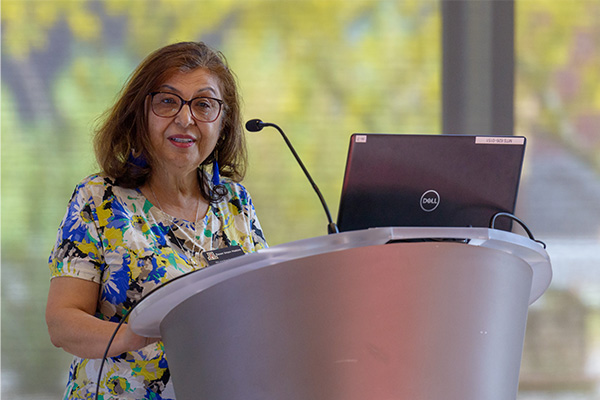
Dean Iman Hakim shared a few words about working with Dr. Robin Harris from the start of the College of Public Health.
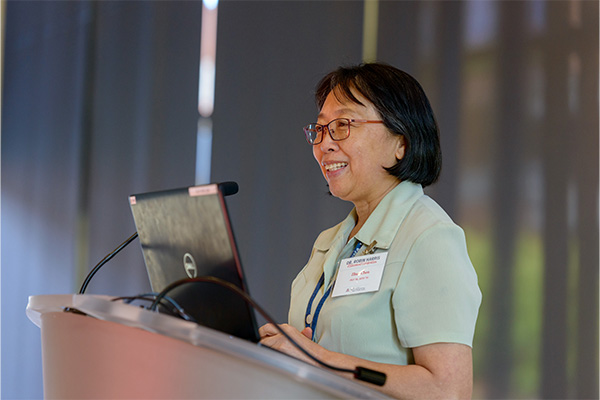
Previous Department Chair of Epidemiology, Dr. Zhao Chen, sharing remarks.
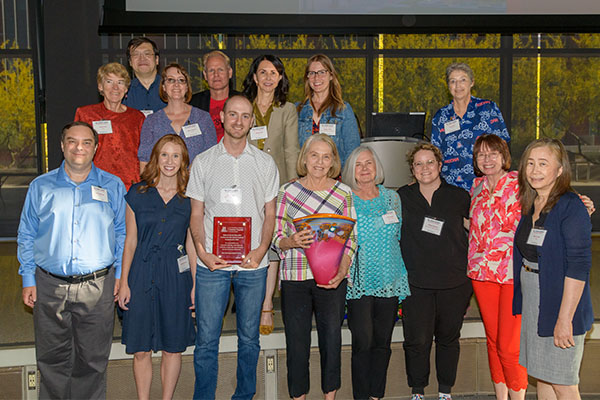
Dr. Robin Harris with faculty and staff from the UACC Skin Cancer Institute.
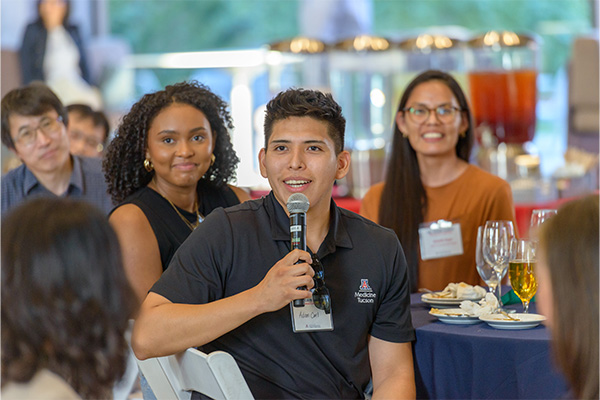
Alumnus and current MD student, Adam Carl MS '21, BSHS '20, shared a few words about Dr. Robin Harris' impact.
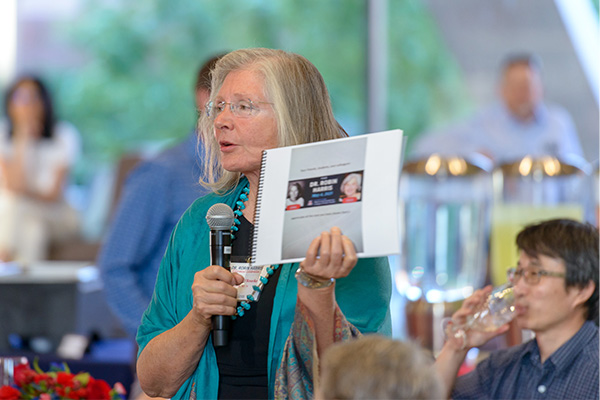
Professor Emerita Dr. Mary Kay O'Rourke shared a memory book she created with alumni and students.
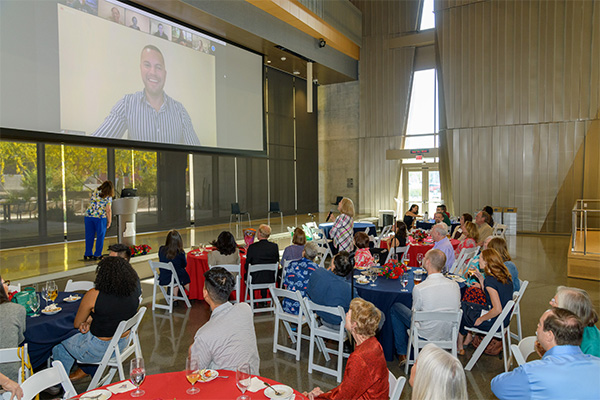
Dr. Robin Harris hearing remarks from alumni, faculty, and staff attending live on Zoom.
Robin B. Harris: A Public Health Champion for Tribal Health and Skin Cancer Prevention
Robin Harris, PhD, MPH, will soon retire as a professor and researcher from the Department of Epidemiology and Biostatistics at MEZCOPH after more than 30 years of dedicated service to public health. Dozens of friends, colleagues, alumni and students gathered at a retirement celebration to express their appreciation for all Robin has done for them and the communities she served around Arizona. The event was hosted by MEZCOPH, the UACC Skin Cancer Institute, and other supporters.
Robin has been a beloved teacher for her students, a much-appreciated colleague for her fellow faculty and researchers, and a favorite collaborator in the communities where she worked. She dedicated her career to serving others through public health, and by doing that work she improved the lives of people and communities across the Southwest and beyond.
A native Arizonan, Robin spent many years outside the state before she returned to the University of Arizona in 1991. She earned her PhD in epidemiology from the University of Washington and her MPH from the University of Texas at Houston. In all her research and projects, Robin emphasized her philosophy that the practice of epidemiology is collaborative by nature, and that community-engaged research is the most effective approach. She worked to blend teaching, research and service by collaborating with faculty from multiple departments, regional health department officials, students, and communities.
A Leader in Research
Dr. Harris worked extensively with community-based epidemiological studies of chronic diseases among many different populations, including tribal communities, border communities, and rural communities in Arizona and Mexico. In all her research projects, Robin sought to incorporate student participation, work with a diversity of local health providers, and fully engage the community to build understanding and support.
Among a range of research projects, Robin worked with multidisciplinary research groups to study human papillomavirus (HPV) infection in men and women and its potential relationships with cancer. She was also the principal investigator of National Cancer Institute projects that focused on investigating geographical relationships between cancer incidence and exposure to arsenic in the State of Arizona as well as a binational study of arsenic exposures from water in Arizona and Sonora, Mexico. She served as the principal investigator of the Hopi Environmental Health Project partnering with the Hopi Tribe to evaluate cumulative environmental exposures of arsenic and air pollution particles known as PM2.5. Over the past several years, Robin worked with a university-community partnership to evaluate cancer screening efforts among Native American men and women in Arizona, and to implement appropriate survey methods for obtaining information for tribes about cancer knowledge, attitudes, and behaviors.
Over the course of her career, Dr. Harris has published dozens of research papers as both a lead author and a contributing author. Each of those papers advanced our knowledge about health and disease, and ultimately helps public health professionals to push for policies and programs that lead to healthier communities.
Reducing Stomach Infections on the Navajo Nation
As the principal investigator for a recent research study on the Navajo Nation that launched in 2018, Robin and her team worked to eliminate a pervasive bacterial stomach infection. The bacterium Helicobacter pylori, known as H. pylori, is one of the most common bacterial stomach infections worldwide and accounts for nearly three-quarters of all gastric cancer. Gastric cancer has significantly decreased in the United States, yet the incidence in the Navajo Nation is nearly four times higher than non-Hispanic white populations in the area.
In collaboration with Diné researchers from Northern Arizona University, Robins and her team formed the Navajo Healthy Stomach Project, funded by the Partnership for Native American Cancer Prevention, that gathered significant data on H. pylori infection among tribal members, and evaluated the understanding about the risk of infection in the community. The education and research continues, and the knowledge will be used to reduce H. pylori on the Navajo Nation.
Fighting Skin Cancer with the UACC Skin Cancer Institute
At the University of Arizona, many of Robin’s research projects broadly focused on causes and prevention of cancer, with an emphasis on skin cancer. As co-director of the UACC Skin Cancer Institute, Robin created a space where skin cancer was acknowledged as the huge problem it is in Arizona and the United States. She brought together faculty and staff to create 4 cores: Outreach, Education, Research, and Patient Care with the mission to prevent and cure skin cancer. She helped re-establish a population-based skin cancer registry, implemented an integrated patient registry-tissue bank into the clinical services of the Cancer Center, and developed effective community messages about sun protection and early detection. She also helped create Project SASS (Students Are Sun Safe) to train young adults in sun safety so they could teach middle school and high school student the same messages. She even facilitated getting it added to the UA curriculum!
Thank you Robin!
All of us in the Mel and Enid Zuckerman College of Public Health will miss Robin! The students she taught, the researchers who collaborated with her, the public health professionals who joined her on projects, and the communities she served are all grateful for her wisdom, determination, and compassion. From all of us in the college, thanks Robin for all positive changes you brought to Arizona and the many communities where you served!

